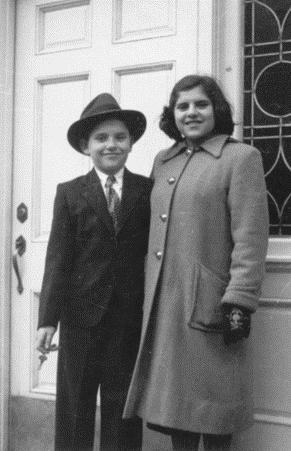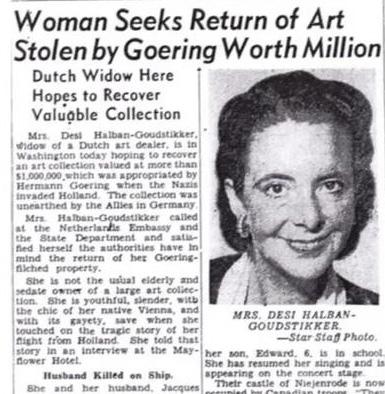
4 minute read
“You Are Free Now!”
It is worth living! True! For all the wanderings, torture and the whole tragedy, you have a family and a purpose in life. It was bad and hopeless and now it is better and hope in the future.”


Above: Popowski family portrait, 1957.
So wrote Mieczyslaw Rylski to my Mother in 1957 after she sent him our first professional family picture from Charleston, SC. Mr. Rylski was a Righteous Gentile who employed my mother Paula and her sister Hannah after their escape. He exemplified the teachings of the Torah.
Kol ma shetirtzu sheya’a’su lachem bney ha’adam, ken gam atem asu lahem. “Do onto others as you would have them do onto you.” That is the guiding principle of mankind. When they were finally liberated in Czestochowa in January, 1945, and in their last conversation with Mr. Rylski, as they left him, my Mother and Aunt asked him: “Why did you do this?” He responded: “I have daughters, and if they were in your circumstances, I hope someone would have helped them.”
I am the child of Holocaust survivors. Henry and Paula Kornblum Popowski were both from the small town of Kaluszyn, a Polish town 50 miles east of Warsaw. Rylski was the owner of a glass factory in Czestochowa, Poland and one of the Righteous Poles who helped my mother and her sister, my aunt survive. The stories of my parents’ survival differed dramatically. My father, Henry Popowski was eleven years older than my mother Paula, and lived as a young man in Warsaw in the late 1930’s. When Germany invaded Poland he was conscripted into the Polish army. After Poland surrendered, he found his way back to Kaluszyn to warn his family of the impending danger and urged them to leave. Two of his six siblings hid in the woods, and the remainder of the Popowski family perished. My father sought refuge in the Warsaw ghetto, and subsequently was incarcerated in the following concentration camps: Kraśnik, Plaszow and Ebensee, a sub-camp of Mauthausen. He survived because of his skills as a carpenter, his family’s trade. When he was liberated by the U.S. Army in May 1945, he and several friends attached themselves to a MASH unit and ultimately reached Landshut, Germany, near Munich where a displaced persons community evolved.
My mother escaped from Kaluszyn to a labor camp four miles away. Her father, Moshe Kornblum, had buried a number of gold coins in their yard. My mother’s family owned the largest enterprise in Kaluszyn, a flour mill, so she began her journey with the remaining assets of that business. My mother, accompanied by her sister Hannah, sewed the coins into their coats and dresses and used them for food, rent, and bribery. (A family friend, the late and beloved South Carolina author Pat Conroy memorialized their story in the character “The Lady with the Coins” in his novel Beach Music.)
Specifically, my Aunt Hannah, with the help of Stanislaw Wozniak, a Catholic work associate of my Grandfather, came to the labor camp and facilitated my mother’s escape. My mother and my aunt, with Mr. Wozniak’s assistance, traveled to Warsaw where they acquired false identification papers, posing as Catholics. Paula Kornblum became Apolonia Borkowska.
They migrated to Czestochowa, nearly 200 miles from Kaluszyn. There they lived in a convent and worked in the Rylski glass factory, using their Catholic identities. After they were liberated in January 1945 by the Russian army, they returned home to Kaluszyn. There, they confirmed that my grandparents, their brother, and numerous family members were gone. The flour mill had been seized by the Polish government now under Russian control. In Kaluszyn, Paula and Hannah did find a group of family friends who had survived and together they traveled to Landshut, Germany, where my parents met. They remained there until 1949, waiting for approval to immigrate to America. During that time, they married and the first of their four children, my brother, Mark, was born. My parents’ immigration to Charleston was sponsored by cousins Joseph and Rachel Zucker. Charleston had a uniquely large number of ex-patriot Kalushiners dating back to the late 19th century. Thus, the city was a welcoming place for my parents, Henry and Paula, to begin their new lives—indeed, they were the last Kalushiners to make Charleston their home. I was born in Charleston, followed by my two sisters, Sarah and Martha. My father first was a peddler in Charleston, Berkeley and Dorchester Counties, and in 1961 he and my mother opened and operated Henry’s Furniture Company on King Street in downtown Charleston. Their four children and all six grandchildren are college graduates and productive citizens having heeded this constant refrain: “America is the best country, be grateful and be a part of it.” Henry Popowski (obm) 82 years old, passed away on May 5, 1994, DAVID almost 49 years to the day of his POPOWSKI liberation. Paula K Popowski (obm) 94 years old, passed away on September 17, 2017, 72 years after she and my aunt were awoken by a Nun at the convent with the words, “You are free now.” ■
David Popwski is a Charleston attorney, civil litigator and business law, and son of Holocaust survivors.












